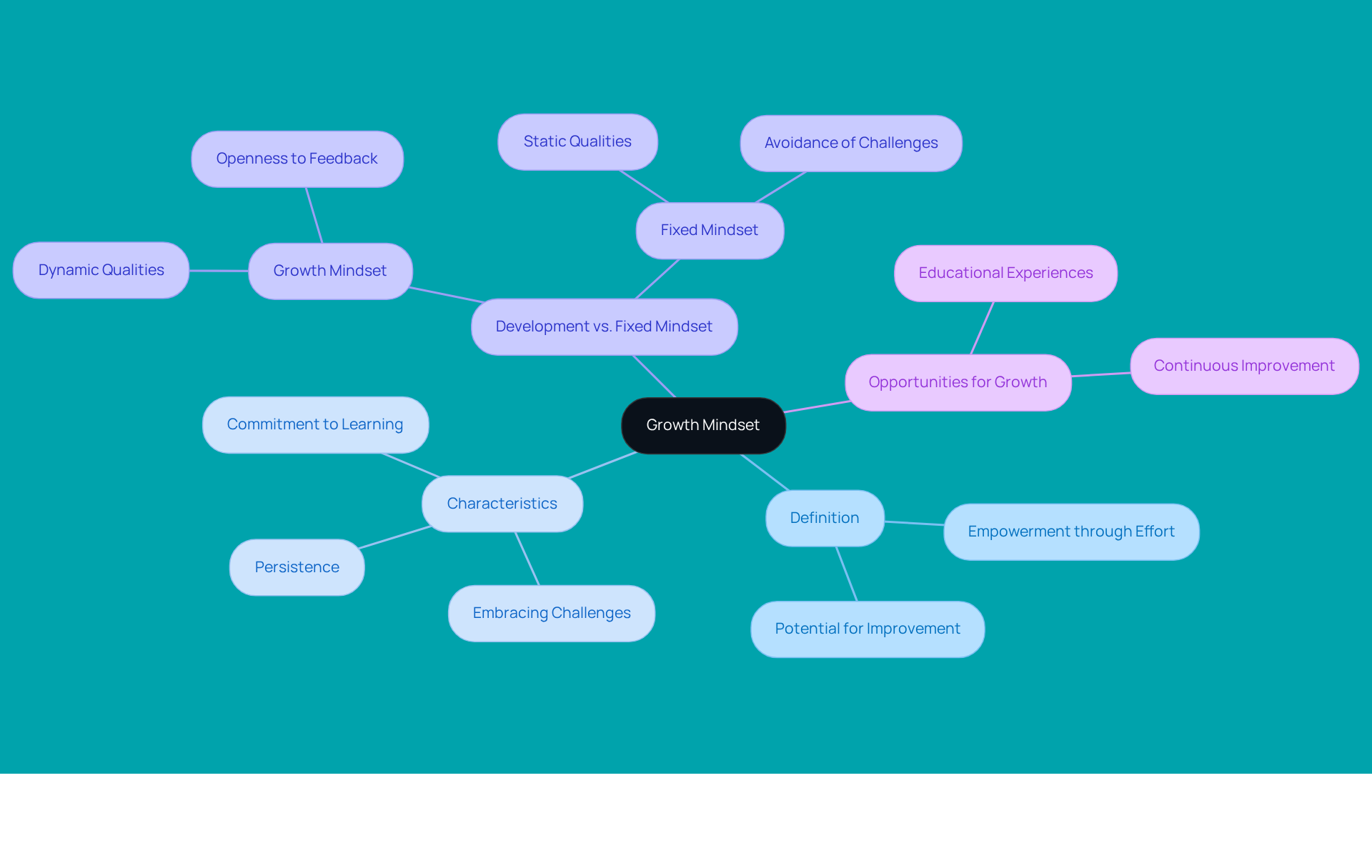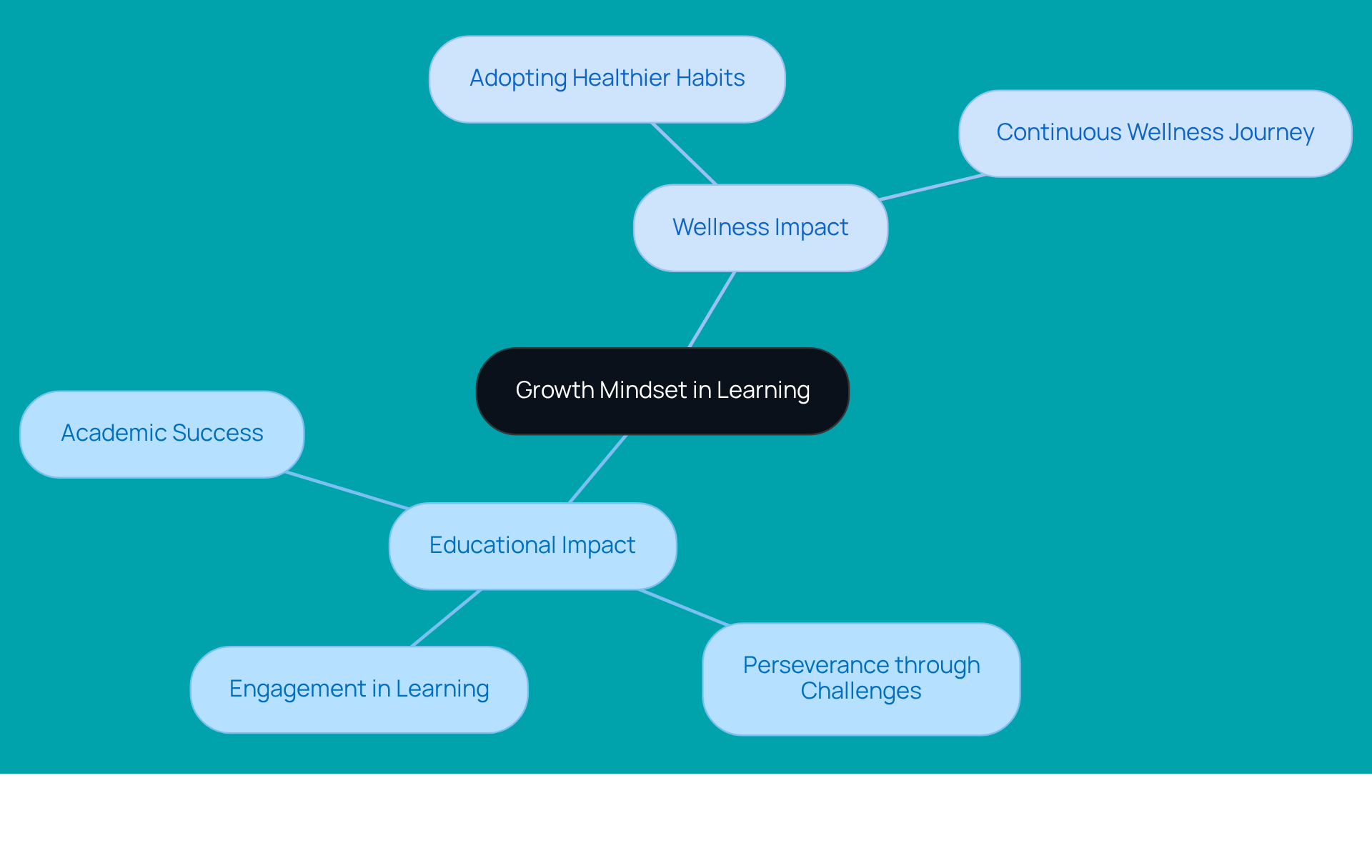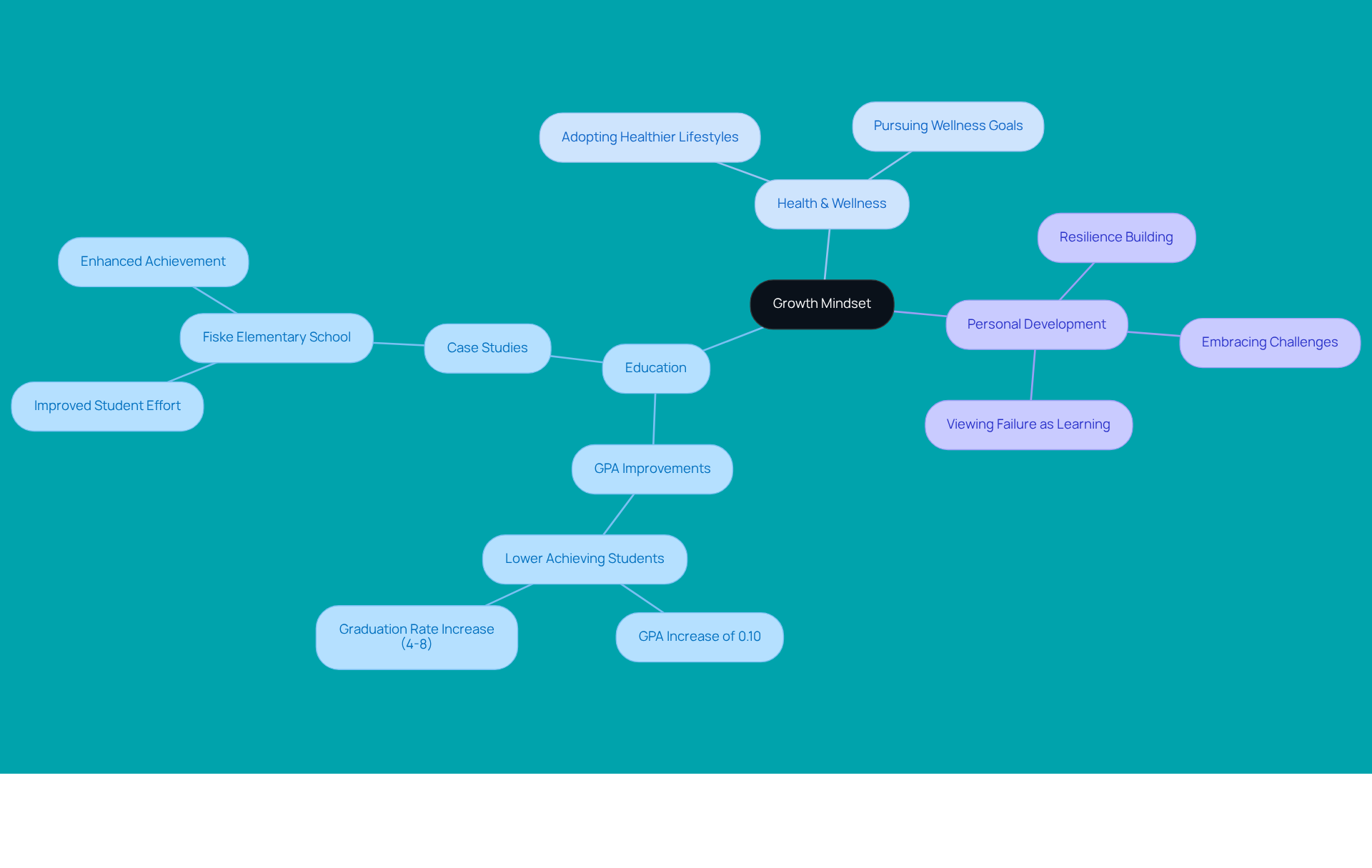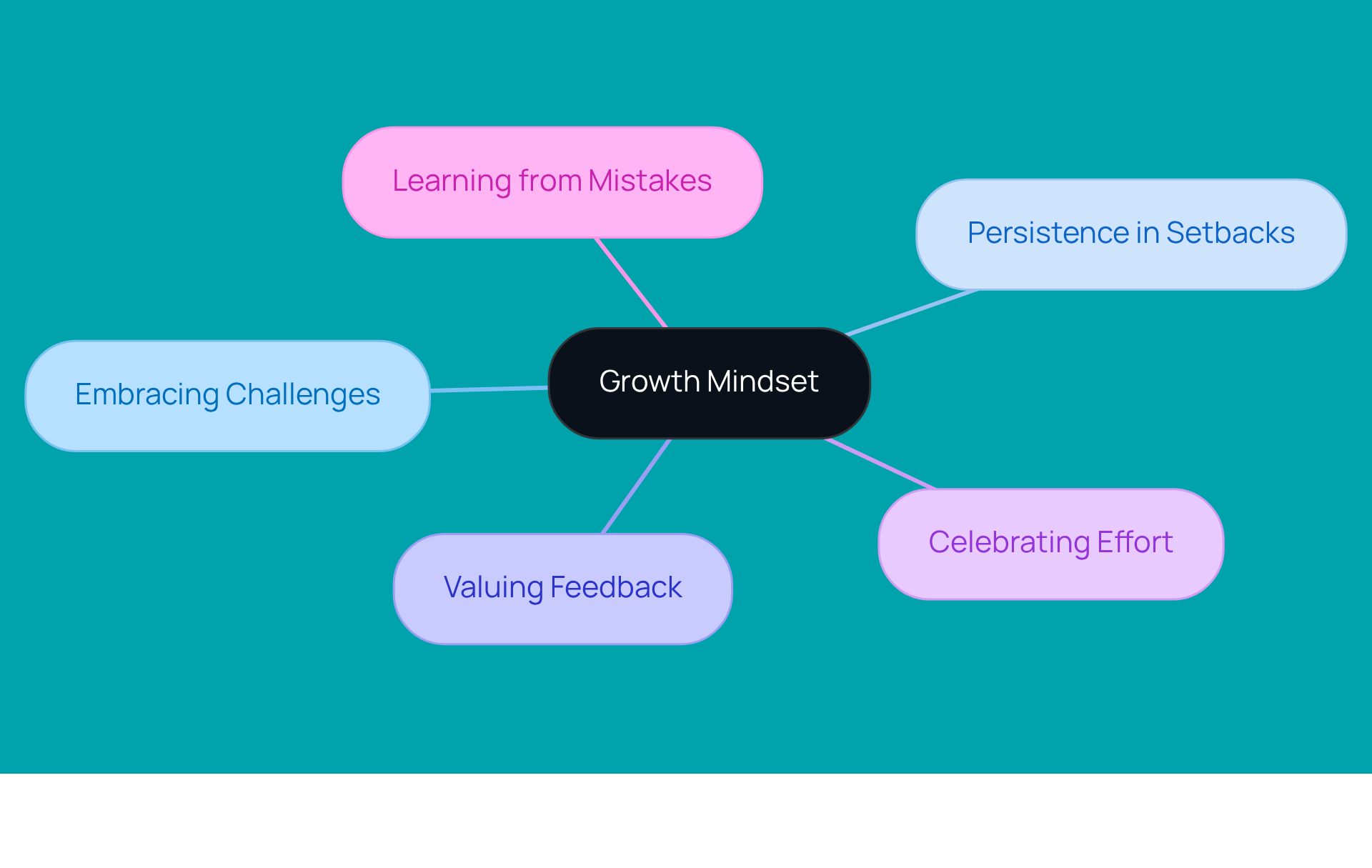Overview
This article gently introduces the concept of a growth mindset, exploring its origins and key traits. It highlights how embracing this mindset can significantly impact personal and academic development, addressing the concerns many individuals face. Imagine facing challenges not as obstacles, but as opportunities for growth. This perspective encourages you to persist through setbacks and view failures as valuable lessons. By nurturing a growth mindset, you can enhance your motivation and achieve your goals. Together, let’s embark on this journey towards improved resilience and success.
Introduction
The concept of a growth mindset has the potential to transform how we approach challenges, learning, and personal development. Rooted in the groundbreaking work of psychologist Carol Dweck, this mindset nurtures the belief that our abilities can be cultivated through dedication and hard work. As we begin to recognize the significance of embracing setbacks as opportunities for growth, you might be wondering: How can adopting this perspective reshape our educational outcomes and personal wellness journeys?
Exploring the origins, traits, and impact of a growth mindset reveals a powerful framework for continuous improvement and resilience in the face of adversity. Imagine if we could harness this mindset to foster not only our own growth but also support one another in our journeys. Together, we can create a community that values learning from challenges and encourages each other to thrive.
Define Growth Mindset
A developmental attitude embodies the belief that each of us has the potential to enhance our capabilities, intellect, and skills through commitment, effort, and persistence. This empowering idea, highlighted by psychologist Carol Dweck, stands in contrast to a fixed mindset, which suggests that our qualities are static and unchangeable.
Imagine if you embraced challenges as opportunities for growth. Those with a development-oriented perspective tend to welcome educational experiences, understanding that every effort contributes to progress. Together, we can cultivate a great mindset and embark on a journey of continuous improvement.

Contextualize Growth Mindset in Learning
The development perspective is truly vital in educational settings, shaping how students confront challenges and setbacks. Imagine if students embraced a great mindset—research indicates that those who do are more likely to engage in learning activities, persevere through obstacles, and ultimately achieve greater academic success. This perspective nurtures a great mindset, encouraging learners to view failures as stepping stones rather than barriers.
In the realm of wellness, this perspective can empower individuals to adopt healthier habits and persist in their wellness journeys. You might be wondering how this aligns with It Works!'s mission of promoting holistic health. By fostering a great mindset, we can support each other in embracing wellness as a continuous journey, rather than a destination. Together, let’s take the next step towards a healthier future.

Trace the Origins of Growth Mindset
The concept of a developmental mindset, introduced by Carol Dweck in the late 20th century, offers a powerful perspective on personal growth. Dweck's studies reveal that our beliefs about our abilities can significantly influence our motivation and achievements. Imagine believing in your potential for improvement—this great mindset inspires individuals to embrace challenges and persist through difficulties.
Research shows that development-oriented interventions can lead to meaningful enhancements in education. For instance, lower-achieving students have seen their GPAs improve by approximately 0.10 grade points, and their graduation rates have increased by 4 to 8 percentage points. Such findings have inspired educators to adopt a development-oriented approach, fostering better learning outcomes for all students.
Consider the case studies conducted at Fiske Elementary School. Here, the implementation of development-oriented strategies led to remarkable improvements in student effort and achievement. These insights extend beyond education; they highlight the potential of a developmental perspective to address disparities in various fields, including health and wellness. This perspective encourages individuals to adopt and pursue their wellness goals with renewed vigor.
Dweck emphasizes that a great mindset, which views failure as a learning opportunity, builds resilience and encourages ongoing personal development. We can all benefit from this nurturing approach, which reminds us that growth is a journey we undertake together. By embracing a great mindset, we open ourselves to continuous improvement and the possibility of achieving our fullest potential.

Identify Key Characteristics of Growth Mindset
Key characteristics of a growth mindset include:
- Embracing Challenges: Imagine seeing challenges not as obstacles, but as opportunities to learn and grow. Individuals with a great mindset understand that these moments are chances to gain valuable knowledge.
- Persistence in the Face of Setbacks: You might be wondering how to keep going when things get tough. Those with a great mindset are more likely to persevere, recognizing that effort is essential for improvement.
- Valuing Feedback: Constructive criticism can feel daunting, but it’s truly a powerful tool for development. Embracing feedback leads to continuous improvement and personal growth.
- Celebrating Effort: Think about the importance of effort over innate talent. By valuing hard work, we cultivate a great mindset that fosters passion for learning and resilience in ourselves and others.
- Learning from Mistakes: Instead of fearing failure, let’s view it as a crucial part of our learning journey. People with a great mindset understand that mistakes are stepping stones to success.
These characteristics not only enhance personal and academic growth but also align beautifully with the principles of holistic wellness. Together, we can encourage healthier habits and lifestyles, supporting each other on this journey toward well-being.

Conclusion
Embracing a growth mindset is essential for personal and academic development. It nurtures the belief that our abilities can be developed through dedication and hard work. This transformative perspective, championed by psychologist Carol Dweck, empowers us to view challenges as opportunities rather than obstacles. Ultimately, this leads to greater resilience and success.
Throughout our discussion, we’ve highlighted key aspects of a growth mindset, including:
- The importance of persistence
- The value of feedback
- The ability to learn from mistakes
These traits enhance our learning outcomes and promote healthier lifestyles, reinforcing the idea that growth is a continuous journey. By understanding the origins of this mindset and its significant impact on education and personal well-being, we can better appreciate its role in achieving our fullest potential.
Ultimately, adopting a growth mindset is a powerful step toward self-improvement and holistic wellness. Imagine if we encouraged a culture that values effort, embraces challenges, and learns from setbacks. Together, we can inspire one another to pursue our goals with renewed vigor. The journey toward personal development is one that we can share, and by fostering a growth mindset, a brighter, more resilient future becomes attainable for all.
Frequently Asked Questions
What is a growth mindset?
A growth mindset is a developmental attitude that embodies the belief that individuals can enhance their capabilities, intellect, and skills through commitment, effort, and persistence.
Who is associated with the concept of growth mindset?
The concept of growth mindset is highlighted by psychologist Carol Dweck.
How does a growth mindset differ from a fixed mindset?
A growth mindset believes that qualities can be developed and improved, while a fixed mindset suggests that qualities are static and unchangeable.
What is the attitude of individuals with a growth mindset towards challenges?
Individuals with a growth mindset embrace challenges as opportunities for growth and welcome educational experiences.
What is the overall message of adopting a growth mindset?
The overall message is that through effort and a commitment to learning, individuals can embark on a journey of continuous improvement.



